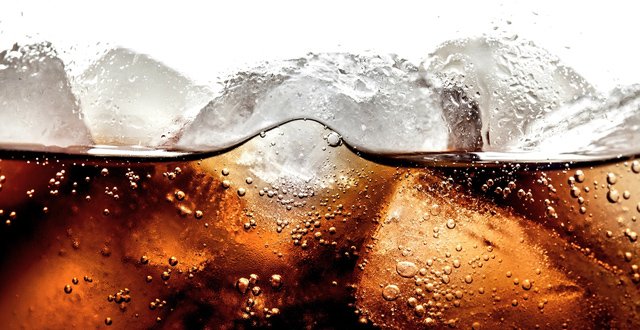
<p class=”p1″><span class=”s1″>T</span>he song <em>St Stephen’s Day Murders </em>(1991) by Paddy
<p class=”p2″><span class=”s2″>Moloney and Elvis Costello features the line: “There’ll </span>be laughter and tears over Tia Marias, mixed-up with that <span class=”s2″>drink made from girders.” That drink is Irn-Bru, an acri</span><span class=”s2″>dine, orange-coloured libation sometimes deployed as a mixer, </span>but more typically quaffed undiluted by alcohol, the better to <span class=”s2″>be savoured by discerning palates in Scotland and around the world, including Ireland.</span>
<p class=”p1″><span class=”s2″>Irn-Bru’s well-known association with girders derives from it having a 0.002 per cent concentration of the iron-contain- </span>ing food additive ammonium ferric citrate. But its main in- <span class=”s2″>gredient is sugar, 10.3g of which are added to every 100ml of </span>the stuff. Or rather, that was the case until the manufacturer AG Barr decided that as of January this year, they would reduce the sugar content from 10.3g to 4.7g/100ml. As com<span class=”s2″>pensation, the artificial sweetener aspartame was to be added.</span>
<p class=”p1″><span class=”s2″>This declaration unleashed a stushie of Wagnerian propor</span>tions. For example, an online petition on <span class=”s3″>www.change.org </span><span class=”s2″>launched by Ryan Allen has attracted over 50,000 signatories, all sharing Ryan’s outrage that this sweet golden thread woven </span>into Scotland’s cultural tapestry had been so cruelly slashed. <span class=”s2″>Accordingly, they demanded that the full complement of sugar be reinstated.</span>
<p class=”p1″><span class=”s1″>AG Barr’s website (</span><span class=”s2″>www.irn-bru.co.uk</span><span class=”s1″>), prepared to shoul</span>der the burden of its responsibilities to consumers, counselled <span class=”s1″>Irn-Bru drinkers thus: “People with diabetes should be aware of the carbohydrate content change and should get medical advice.” It’s beyond parody, but I do love that wee touch of substi</span>tuting the more sciencey ‘carbohydrate’ for ‘sugar’.
<p class=”p1″><span class=”s1″>I’m no medic, but if I were I’d advise people with diabetes — and without — to run a mile from all sugar-sweetened bev</span>erages (SSBs), pointing out that “chronic overconsumption of <span class=”s1″>SSBs is amongst the dietary factors most consistently found to be associated with obesity, type 2 diabetes and cardiovascular disease risk in large epidemiological studies”. This is cited </span>by Arsenault et al (<em>Nutrients</em>, 2017, 9, 600) in their ‘Targeting over-consumption of sugar-sweetened beverages… ’
<p class=”p1″>As for the addition of aspartame, soft-drink manufacturers won’t have space on their websites to refer customers to a pa<span class=”s1″>per by Suez et al (<em>Nature</em>, 9 October 2014), whose title sums up </span><span class=”s3″>what happened when commercial formulations of saccharin, su- </span><span class=”s1″>cralose or aspartame were added to the drinking water of mice (none of whom had petitioned for the change): “Artificial sweet- </span><span class=”s3″>eners induce glucose intolerance by altering the gut microbiota.”</span>
<p class=”p1″><span class=”s1″>The Scottish Diabetes Survey 2015 reported: “There were </span>284,122 people diagnosed with diabetes in Scotland recorded <span class=”s1″>on local diabetes registers at the end of 2015. This represents 5.3 per cent of the population.” And Diabetes Ireland (</span><em><span class=”s2″>www. diabetes.ie</span></em><span class=”s1″>) notes: “854,165 adults over 40 in the Republic of </span>Ireland are at increased risk of developing (or have) type 2 di- <span class=”s1″>abetes. More alarmingly, there are a further 304,382 in the 30-to-39-year age group that are overweight and not taking the weekly 150 minutes’ recommended physical activity, leav</span>ing them at an increased risk of chronic ill health.”
<p class=”p1″><span class=”s1″>As Keaver et al observed in their ‘Energy drinks available in Ireland: A description of caffeine and sugar content’, published in <em>Public Health Nutrition </em>(doi:10.1017/S1368980017000362), </span>of 78 products identified, sugar concentration ranged from 2.9g <span class=”s1″>to 15.6g/100ml. Keaver et al’s other findings add to a burgeoning evidence base to show that SSBs are harmful to health. For a more recent example, when Loader et al investigated the ‘Effects of sugar-sweetened beverage consumption on microvascular and macrovascular function in a healthy population’ (<em>Ar- terioscler Thromb Vasc Biol</em>. 2017;37:1250-1260), they found </span>“that commercial SSB consumption induces microvascular and <span class=”s1″>macrovascular endothelial dysfunction in a healthy population”.</span>
<p class=”p1″><span class=”s1″>Yet the buffoonery of a petition calling for more sugar to be dumped into drinks at a time when obesity is rising and health services are creaking serves as a reminder that large swathes </span>
<p class=”p1″><span class=”s1″>of the population in the UK ( and perhaps Ireland?) have abdi- cated responsibility for their health. And here a phrase of Gore </span>Vidal comes to mind: He was railing against the “Hacks of Ac- <span class=”s1″>ademe”, but it is appropriate here too, because we have today “the new barbarians, serenely restoring the Dark Ages”. We </span>are now living in the Dark Ages of the soul, where responsibil<span class=”s1″>ity for introspection, self-restraint, reflection, is handed over to others who will tell us what to think… and eat… and drink. The irony is that in the Dark Ages they ate better than we do </span>today: Proper meat, fish, dairy, vegetables; not the processed, ersatz stuff that can cause disease.
<p class=”p1″><span class=”s1″>So it’s time for governments to govern, and to do for the </span>masses what many individuals are unable to accomplish them<span class=”s1″>selves: Take responsibility for our health. Raising taxes to out</span>law sugar would be a start.
<p class=”p1″><span class=”s1″>However, Frances Perraudin in <em>The Guardian </em>(21 November </span><span class=”s2″>2016) notes that after the election of 56 Scottish Nationalist Par</span><span class=”s1″>ty (SNP) MPs to Westminster, there were 8,708 cans or bottles of Irn-Bru sold across the parliamentary estate: “Patrick Grady, the SNP MP for Glasgow North, said the carbonated drink gave </span><span class=”s2″>politicians ‘sustenance’ through the long days in the Commons.”</span>
<p class=”p1″>Perhaps we do get the politicians we deserve.





Leave a Reply
You must be logged in to post a comment.